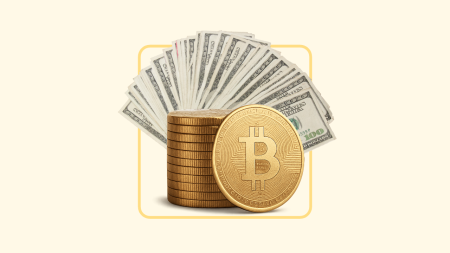Stocks plummeted to start 2025, egged on by a slowing economy and U.S. President Donald Trump’s announcement of tariffs on major trading partners. Both the S&P 500 stock index and the tech-heavy Nasdaq index entered bear market territory, meaning they declined by 20 percent or more from a recent high.
With tariffs likely to hit the U.S. economy hard, possibly leading to a recession, investors need to pay careful attention to their investments. In that scenario, the riskiest investments could perform poorly. Here are some investments you may want to consider avoiding in 2025.
Top 5 riskiest investments right now
So how do investors protect their portfolios for the remainder of 2025? One key way is to avoid the highest-risk investments, those that might not make it out the other side of a recession without taking a big hit.
1. Cryptocurrency
Cryptocurrency is a kind of digital currency that has taken the investing public’s fancy in the last eight years or so. But it’s among the riskiest possible investments because it’s usually not backed by the assets or cash flow of any underlying entity. So crypto traders are basically trying to outguess other traders about which digital token will move higher.
Legendary investor Warren Buffett has come out strongly against crypto. In the April 2022 annual meeting of his company Berkshire Hathaway, Buffett said: “Whether it goes up or down in the next year, or five or 10 years, I don’t know. But the one thing I’m pretty sure of is that it doesn’t produce anything …. Assets, to have value, have to deliver something to somebody.”
Ultimately, the only thing backing cryptocurrency is investor sentiment, and that could dry up at any point. Bitcoin and Ethereum have seen strong performance over the past year, notwithstanding recent declines, but whether or not that will continue is anyone’s guess.
2. Consumer discretionary stocks
Unlike consumer staples — long a favorite of Buffett — where the products are purchased almost regardless of the economy, the results at consumer discretionary firms can be more volatile. Discretionary companies often depend significantly more on the overall health of the economy than do staples, meaning that discretionary demand fluctuates more during a downturn.
While some discretionary companies might show relatively stable sales, most others fluctuate much more. For example, hotels, restaurants and leisure are popular sectors when the economy is booming, but sales quickly fall when times get tougher and consumers cut back. Industries that are sensitive to interest rates, such as housing and autos, could also be impacted if rates stay high.
So if the economy slows, consumer discretionary could be a good place to avoid.
3. High-yield bonds
High-yield bonds, formerly known as junk bonds, can vary widely in quality. The debt might be issued from pretty good companies or quite awful ones. So, if you’re investing in individual bonds, you’ll need to examine each firm to see whether it’s a quality company or not.
As the economy moves into a recession, investors demand a greater potential return on the truly bad companies and therefore push the price of their bonds lower to compensate. While high-yield bonds will often move lower in a recession, many of the worst will stay down.
If you’re buying an ETF or mutual fund, you may want to steer clear of high-yield bond funds. While diversification can likely help protect you from a few blowups, it won’t protect you from the general markdown that can sweep over high-yield bonds as investors run scared.
4. Stocks of highly indebted companies
Highly indebted companies can be dangerous investments at any time. But going into a recession, these stocks can be deadly. These companies spent the boom times racking up debt or not paying it off. In a downturn, they’re often hit by flagging sales, which could make it even harder to pay down their debts. Plus, all that debt hamstrings the kind of desperate actions they may need to take to survive.
The weakest of the highly indebted companies may end up being priced for death, and for good reason. Some will go bankrupt, but those that do come out the other side of a downturn can produce spectacular returns, as investors decide the company isn’t ready to die. Then the stock goes from “marked for death” to “heavily discounted compared to rivals,” and they can suddenly become the market’s best-performing stocks. But time the switch at your peril!
5. Cyclical industrial companies
Like consumer discretionary companies, cyclical industrial companies can really feel the boom and bust cycle of the economy. When times are good, it feels like they couldn’t get better. And when they’re bad, it may seem like they couldn’t get worse. Their stocks reflect this dualism, with rapid appreciation during the flush times and just as rapid descent during the cooldown.
The tricky thing with cyclical industrial companies is that they may look cheapest exactly when it’s most dangerous to invest in them. On valuation measures such as the price-earnings (P/E) ratio, they will entice investors with their siren song of low multiples (seven to 10 times earnings) near their peak. Meanwhile, when they’re cheapest during or after a recession, they look quite expensive, trading for multiples of 40 or 50 times earnings, if they’re even generating profit.
That said, if you know what you’re doing, you can make a killing when the market flips on the other side of a recession.
Bottom line
Investing in individual securities is a difficult game to win because it requires a lot of time and energy. You may be able to do as well or better by taking some classic advice from Warren Buffett. The Oracle of Omaha has long advised investors to buy and hold an index fund based on the S&P 500, which has returned about 10 percent annually over long periods. While it, too, may decline during an economic downturn, the fund owns a diversified portfolio of America’s best companies, meaning that it’s likely to go right back up when the economy turns around.
— Bankrate’s Brian Baker contributed to an update of this story.
Editorial Disclaimer: All investors are advised to conduct their own independent research into investment strategies before making an investment decision. In addition, investors are advised that past investment product performance is no guarantee of future price appreciation.
Read the full article here












